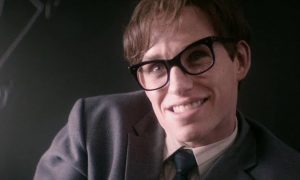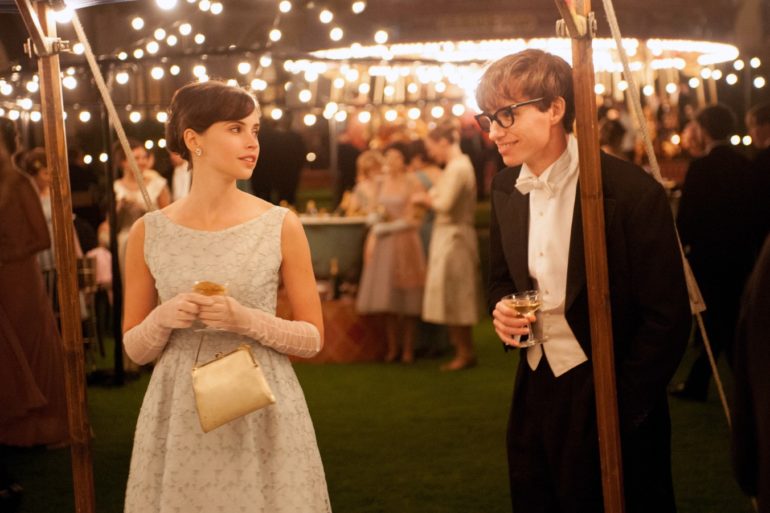The Theory Of Everything traces the long-lasting relationship between renowned physicist Stephen Hawking and his first wife Jane Wilde, adapted from Wilde’s revised memoir Travelling To Infinity: My Life With Stephen, tracking their halcyon days in 1960s Cambridge through to the publication of Stephen’s A Brief History Of Time in 1988. Best known for the much-lauded Philippe Petit documentary Man On Wire, Director James Marsh made his first foray into narrative film with the acclaimed 2012 troubles drama Shadow Dancer. There’s much to admire about Marsh’s second narrative feature, wistfully shot and exceptionally played, with Eddie Redmayne and Felicity Jones both turning in career-best performances. Yet Anthony McCarten’s screenplay attempts to provide a balanced, borderline impartial portrait of the Hawking’s often troubled marriage, meaning we’re occasionally left wishing for a more incisive representation of this extraordinary, yet ultimately troubled union.
The Theory Of Everything wastes no time in bringing its leads together. Meeting for the first time at a college party, they’re as endearing as they are an awkward coupling, and before too long they’re embracing beneath the May Ball fireworks display. The distinction between the pair (He a man of science, she of the arts) is firmly established yet thankfully never overplayed, as if to form the bedrock of their union. The film frames this meet-cute against Stephen’s initial struggles to narrow down his field of doctoral research, leading up to his devastating diagnosis with Motor Neurone Disease at the age of just 21. Given two years to live, a devastated Hawking shuts out Jane, yet undeterred, she vouches to support him through his illness. Despite knowing she will likely be widowed, her steadfast loyalty leads her to ignore the warnings of Hawking’s parents. Two years pass, then another two, and gradually yet inevitably, the couple’s marriage becomes strained as they struggle to balance family life with the difficulties arising from his illness, both physical and emotional.
Those expecting an in depth look at Hawking’s body of work will be disappointed, as Marsh’s film is far more concerned with exploring the emotional complexities of the Hawking’s marriage. Despite its emotive core, Marsh is mostly successful at ensuring that the film never slips into lazy melodrama, aided no end by a powerful ensemble. Undoubtedly one of the more striking physical transformations in recent years, much of the pre-release awards talk has centred upon Redmayne’s Hawking. Following his early foppish geekiness, all awkward grins and nervous energy, there’s an uncanniness to the actor’s gradual disappearance as he comes to embody the Hawking most people will have grown up knowing. Redmayne’s role becomes all the more challenging as Hawking’s condition deteriorates, facial tics and body movements becoming his sole means of communicating emotion. Alongside this, the character’s increasingly aloof nature ensures that a distance is created between character and audience, so while the transformation is undoubtedly impressive, it becomes difficult to maintain identification with the character, compounded by the second act shift in focus towards Wilde.
 While Redmayne’s arc provides the film with its narrative centre, taking in Hawking’s assorted achievements in his extraordinary career, Jones is equally exceptional at communicating the key emotional conflicts at the screenplay’s core. A difficult role, she’s tasked with conveying Jane’s loneliness and buried desires whilst never painting her as a victim in her struggles to maintain their sinking relationship. The film’s most memorable scene sees Jane attempt to teach Stephen, post-tracheotomy, how to communicate using colour-coded charts. As Jane repeatedly attempts to incite some kind of response from her husband, Stephen’s thousand-yard stare marks the complete dissolution of their marriage long before either party outright admits it. The second act’s love-triangle takes the first steps towards this, with Charlie Cox’s Jonathan coming to embody a kind of surrogate father figure for the Hawking family in ways that the now wheelchair-bound Stephen cannot, yet the character is rendered sympathetic through Cox’s strong supporting performance.
While Redmayne’s arc provides the film with its narrative centre, taking in Hawking’s assorted achievements in his extraordinary career, Jones is equally exceptional at communicating the key emotional conflicts at the screenplay’s core. A difficult role, she’s tasked with conveying Jane’s loneliness and buried desires whilst never painting her as a victim in her struggles to maintain their sinking relationship. The film’s most memorable scene sees Jane attempt to teach Stephen, post-tracheotomy, how to communicate using colour-coded charts. As Jane repeatedly attempts to incite some kind of response from her husband, Stephen’s thousand-yard stare marks the complete dissolution of their marriage long before either party outright admits it. The second act’s love-triangle takes the first steps towards this, with Charlie Cox’s Jonathan coming to embody a kind of surrogate father figure for the Hawking family in ways that the now wheelchair-bound Stephen cannot, yet the character is rendered sympathetic through Cox’s strong supporting performance.
Although Marsh’s subtle, tasteful direction spares us an overly-sentimental reading of the material, The Theory Of Everything is sorely wanting of a purely emotional gut-punch moment which never arrives. Despite marvelling at Jane’s humanity and determination, we never truly feel the heart-wrenching sense of a marriage in freefall. McCarten’s script has a tendency to approach its characters somewhat impartially, with the narrative often unfolding akin to a carefully-considered memory, somewhat in line with the multiple revisions made by Wilde to the depiction of their marriage in her second memoir. It’s defined by this respectful refusal to judge the Hawking’s respective actions and inactions, yet in turn, serves to overly-sanitize the story, distancing its audience from the core drama as it unfolds. The introduction of Hawking’s nurse Elaine Mason (Maxine Peake), comes late in the day, the lasting effects of her arrival unfolding less like an emotive full-stop than a footnote.
The Theory Of Everything is not without its narrative faults, with emotional investment occasionally hindered by its failure to permeate the surface of central protagonists. Nonetheless, Marsh’s film is elevated by outstanding performances from its leads, making this a theory worth exploring.

